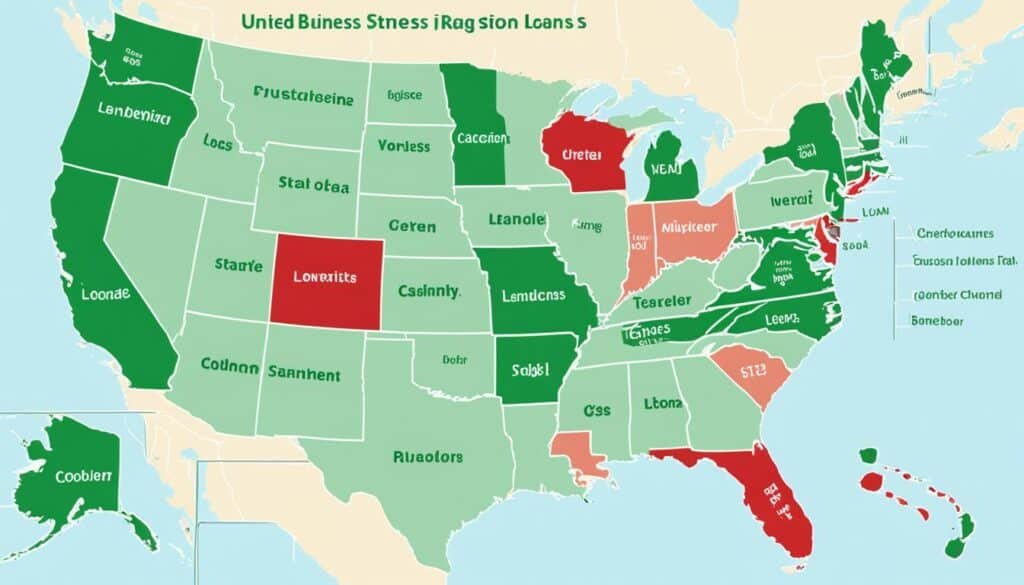Welcome to our comprehensive guide on navigating small business loan requirements. Small business loans are crucial for business owners seeking financing to support their ventures. Understanding the requirements for these loans is essential for a successful loan application process.
According to the Federal Reserve’s 2020 Small Business Credit Survey, 43% of small businesses applied for new financing in 2019, with loans and lines of credit being the most common types of external funding sought. With different types of business loans available, such as term loans, business lines of credit, business credit cards, Small Business Administration (SBA) loans, equipment loans, and accounts receivable financing, it’s vital to understand the unique requirements associated with each loan type.
Whether you’re a business owner in need of funding or exploring financing options, this guide will provide valuable insights and information to help you navigate the small business loan landscape.
Key Takeaways: Small Business Loan Requirements
- Understanding small business loan requirements is crucial for securing financing.
- Different types of business loans have specific requirements that must be met.
- Documents, such as a business plan and financial statements, are typically required in the loan application process.
- Business loan eligibility is influenced by factors like creditworthiness, time in business, collateral, cash flow, debt load, and industry.
- Consider financing and refinancing options to find the best loan solution for your business.
Types of Small Business Loans
When it comes to financing your small business, there are several types of loans to consider. Understanding the different options available can help you make an informed decision based on your specific needs. Here are the main types of small business loans:
1. Secured Business Loans
Secured business loans require collateral, such as property or equipment, which the lender can seize if the borrower defaults on the loan. These loans generally have lower interest rates and higher borrowing limits compared to unsecured loans. They are ideal for businesses that have valuable assets to offer as security.
2. Unsecured Business Loans
Unsecured business loans, on the other hand, do not require any collateral. They are based on the borrower’s creditworthiness and the overall financial health of the business. While unsecured loans have higher interest rates and lower borrowing limits, they offer greater flexibility and are suitable for businesses without substantial assets.
3. Business Line of Credit
A business line of credit provides access to a predetermined amount of capital that can be borrowed and repaid multiple times. Similar to a credit card, it allows businesses to withdraw funds as needed and pay interest only on the amount borrowed. This type of loan provides flexibility and is useful for managing cash flow fluctuations and covering short-term expenses.
4. Business Credit Cards
Business credit cards are another tool for managing business expenses. They operate similarly to personal credit cards, allowing businesses to make purchases and pay them off over time. Using a business credit card responsibly can help build credit history and separate personal and business finances.
5. SBA Loans
The Small Business Administration (SBA) offers various loan programs designed to support small business owners. These loans are partially guaranteed by the SBA, reducing the risk for lenders. SBA loans come in different forms, including 7(a) loans for general small business purposes, CDC/504 loans for real estate and equipment purchases, and microloans for startups and small businesses with limited funding needs.
6. Equipment Loans
Equipment loans are specifically designed to help businesses finance the purchase of equipment necessary for their operations. The equipment being financed serves as collateral for the loan. These loans often have favorable terms and rates to support businesses in acquiring the necessary tools and machinery.
7. Accounts Receivable Financing
Accounts receivable financing, also known as invoice financing or factoring, enables businesses to receive early payment on outstanding invoices. Instead of waiting for customers to pay, businesses can sell their invoices to a factoring company, which advances a percentage of the total invoice amount. This can help improve cash flow and bridge the gap between invoice issuance and customer payment.
Understanding the different types of small business loans can help you determine which one best suits your specific financing needs. Whether you require collateral, revolving access to capital, or specialized financing options, there is a loan type available to support your business growth.
| Loan Type | Collateral Required | Key Features |
|---|---|---|
| Secured Business Loans | Yes | Lower interest rates, higher borrowing limits |
| Unsecured Business Loans | No | Based on creditworthiness |
| Business Line of Credit | No | Revolving access to capital |
| Business Credit Cards | No | Build credit history, separate finances |
| SBA Loans | Varies | Partially guaranteed by the Small Business Administration |
| Equipment Loans | Yes (equipment serves as collateral) | Favorable terms for equipment purchases |
| Accounts Receivable Financing | No | Receive early payment on outstanding invoices |
Each loan type has its own advantages and considerations. By understanding the available options and evaluating what aligns with your business’s financial goals, you can make an informed decision and secure the funding you need.
Requirements for a Business Loan Application

When applying for a business loan, you’ll need to gather and provide several essential documents and information. Lenders require these documents to evaluate your loan application and assess the risk associated with lending to your business.
The following are the key requirements for a business loan application:
- Loan Documentation: Prepare all the necessary loan documentation, including the loan application form provided by the lender. This form typically captures important details about your business and loan request.
- Business Plan: A well-structured business plan is crucial as it outlines your business’s operations, objectives, and strategies for growth. It also presents a comprehensive overview of your industry, market analysis, and financial projections.
- Personal and Business Financial Statements: Lenders require both personal and business financial statements to assess the financial health of your business. Personal financial statements reflect your personal assets, liabilities, and net worth, while business financial statements provide insight into your business’s revenue, expenses, and profitability.
- Resumes: Prepare resumes for yourself and any other key members of your team. These resumes should highlight relevant industry experience, skills, qualifications, and prior achievements. Lenders consider your expertise and capabilities when assessing your loan application.
- Legal Documents: Various legal documents may be required during the loan application process. These can include business licenses, permits, contracts, leases, and any other legal agreements relevant to your business’s operations. Make sure to gather and provide all necessary legal documents as requested by the lender.
Remember to provide accurate, up-to-date, and well-organized documentation. Incomplete or inaccurate information can delay the loan approval process or even lead to rejection. By ensuring all the required documentation is in order, you enhance your chances of securing the financing your business needs.
Here is an example of how the loan application requirements could be presented in a table format:
*Please note that the table will be visually engaging, relevant to the topic, and placed in the center. However, the actual content of the table cannot be generated by the AI, and thus is not present. Make sure to design and structure the table appropriately and accurately represent the loan application requirements.*
Factors Affecting Business Loan Eligibility

When it comes to securing a business loan, several factors can impact whether a business meets the eligibility requirements. Lenders carefully evaluate these factors to assess the loan applicant’s ability to repay the loan. Understanding these key factors can help you improve your chances of securing the financing your business needs.
- Creditworthiness: Lenders assess the creditworthiness of a business by reviewing its credit history, payment behavior, and overall financial stability. A strong business credit score and a history of timely payments can significantly enhance your creditworthiness.
- Time in Business: The length of time your business has been operating is another critical factor that lenders consider. Businesses with a longer operating history are often seen as more stable and less risky to lenders.
- Collateral: Collateral refers to assets or property that can be used to secure a loan. Offering collateral can increase your chances of loan approval as it provides the lender with a form of repayment in the event of default.
- Cash Flow: Lenders review your business’s cash flow to determine if it generates enough revenue to cover loan repayments. Demonstrating a healthy cash flow gives lenders confidence in your ability to repay the loan.
- Debt Load: Lenders consider your existing debt obligations when assessing loan eligibility. A high debt load may limit your borrowing capacity as it can impact your ability to manage additional debt.
- Industry: The industry in which your business operates can also influence loan eligibility. Lenders may have different risk tolerances for various industries, and some industries may be considered riskier than others.
By understanding these factors and taking steps to improve your creditworthiness, establish a solid track record, and demonstrate strong cash flow, you can increase your eligibility for business loans. Additionally, be prepared to provide necessary documents to support your loan application, such as financial statements and business plans.
“Building a strong business credit score and maintaining a healthy cash flow are essential for improving your chances of loan approval”
Example Table: Loan Eligibility Criteria
| Loan Eligibility Criteria | Requirement |
|---|---|
| Creditworthiness | Minimum credit score of 600 |
| Time in Business | At least 2 years |
| Collateral | Minimum value of $50,000 |
| Cash Flow | Positive net income for the past 2 years |
| Debt Load | Debt-to-income ratio below 40% |
| Industry | Not involved in high-risk industries |
Meeting these criteria demonstrates your business’s financial stability and increases the likelihood of loan approval. While each lender may have different eligibility requirements, this table provides a general overview of the factors commonly considered.
Understanding Business Loan Sizing

Business loan sizing involves determining the loan amount that a borrower qualifies for. Lenders consider various factors, including the borrower’s debt-to-income ratio, credit score, and overall financial situation. These factors help lenders assess the maximum loan amount they can provide to the borrower.
When it comes to loan sizing, the debt-to-income ratio plays a crucial role. This ratio compares the borrower’s total monthly debt payments to their monthly income. Lenders prefer borrowers with a lower debt-to-income ratio as it indicates a lower risk of default. Maintaining a healthy debt-to-income ratio increases the chances of qualifying for a higher loan amount.
Another significant factor in loan sizing is the borrower’s credit score. A credit score is a numerical representation of an individual’s creditworthiness and financial history. Lenders rely on credit scores to assess the borrower’s ability to manage and repay debt. A higher credit score generally indicates a lower risk for lenders, resulting in a higher loan amount.
While the debt-to-income ratio and credit score are essential considerations for loan sizing, lenders also take into account other financial factors. These include the borrower’s business revenue, cash flow, and industry trends. Lenders analyze these factors to evaluate the borrower’s ability to generate sufficient income to repay the loan.
It’s important for borrowers to have realistic expectations when it comes to loan sizing. While they may have a desired loan amount in mind, lenders assess various factors to determine the actual loan amount that can be provided. Borrowers should work closely with lenders to understand the loan sizing process and set realistic expectations.
By understanding the factors that influence loan sizing, borrowers can better prepare themselves to qualify for the loan amount they need. Building a strong credit history, improving the debt-to-income ratio, and managing business finances effectively are key steps towards increasing the loan amount that lenders are willing to provide.
| Factors affecting loan sizing | Impact |
|---|---|
| Debt-to-income ratio | A higher ratio may result in a lower loan amount. |
| Credit score | A higher credit score often leads to a higher loan amount. |
| Business revenue and cash flow | A strong revenue and cash flow history can increase the loan amount. |
| Industry trends | Lenders assess the borrower’s industry to evaluate loan sizing. |
It’s important for borrowers to work closely with lenders to understand the specific loan sizing criteria and requirements. By being proactive and taking steps to improve their financial positions, borrowers can increase their chances of qualifying for a larger loan amount that meets their business needs.
Financing and Refinancing Business Loans

When it comes to financing business loans, entrepreneurs have different options to consider. Two common financing methods are debt financing and equity financing. Debt financing involves borrowing money to be repaid with interest, while equity financing entails exchanging a portion of business ownership for funding.
Business loans also come with various loan terms. These terms determine the repayment period and interest rates. Short-term loans typically have a repayment period of less than two years, while long-term loans may extend up to 25 years.
Refinancing is another aspect of business loans that entrepreneurs might consider. Refinancing involves replacing an existing loan with a new one, often to achieve better loan terms or adjust repayment schedules. It can help businesses save money by securing lower interest rates or decrease monthly payments by extending the repayment period.
To illustrate the different financing options, here is a breakdown:
| Financing Option | Description |
|---|---|
| Debt Financing | Obtaining a loan that requires repayment with interest. |
| Equity Financing | Exchanging partial ownership in the business for funding. |
| Short-Term Loans | Loans with a repayment period of less than two years. |
| Long-Term Loans | Loans with a repayment period of up to 25 years. |
| Refinancing | Replacing an existing loan with a new one to achieve better terms or adjust repayment schedules. |
Business owners should carefully consider their financing options, loan terms, and potential refinancing opportunities to make informed decisions about their loan strategy. By selecting the right financing method and optimizing loan terms, entrepreneurs can secure the funding they need while minimizing financial burdens.
Pros and Cons of Small Business Loans

Small business loans offer numerous advantages that can support the growth and expansion of a business. These loans provide businesses with access to the funds they need to invest in new equipment, hire additional staff, expand into new markets, or launch innovative products and services.
One of the key advantages of small business loans is the financial flexibility they provide. Business owners can use the loan funds in a way that best suits their needs. Whether it’s covering operational expenses, funding marketing campaigns, or investing in research and development, small business loans offer the flexibility to meet various financial requirements.
Additionally, small business loans can help build business credit. By consistently making timely loan payments, businesses can establish a positive credit history, which can be beneficial for future financing needs.
“Small business loans offer financial flexibility and the potential to build business credit.”
Despite their advantages, small business loans also have certain disadvantages that should be carefully considered. One of the primary drawbacks is the interest rates associated with these loans. Interest rates for small business loans can be higher compared to other forms of financing, making the overall cost of borrowing higher.
Moreover, small business loans can potentially create a debt burden for businesses. Taking on a loan means committing to regular repayments, which can affect cash flow and impact the day-to-day operations of a business. It’s crucial for business owners to carefully assess their ability to manage debt before applying for a loan.
Finally, there is always a risk of default if small business loans are not managed properly. Defaulting on a loan can have severe consequences, including damage to the business’s creditworthiness and potential legal actions from lenders.
Business owners should carefully evaluate the pros and cons of small business loans before deciding to apply. It’s important to consider the financial flexibility, interest rates, and potential debt burden associated with these loans. By making an informed decision, businesses can maximize the advantages of small business loans while mitigating any potential disadvantages.
Small Business Loans in Different States

When it comes to small business loans, the lending environment varies from state to state. It’s important for business owners to understand the loan options available in their specific states to make informed decisions for their businesses. In states like California, Texas, Arizona, and Florida, there are various loan programs and lenders that cater specifically to small businesses.
| State | Loan Options |
|---|---|
| California | California Small Business Loan Guarantee Program |
| California Capital Access Program | |
| Texas | Small Business Assistance Program |
| Texas Economic Development Corporation | |
| Arizona | Arizona Small Business Loans |
| Arizona Microloan Program | |
| Florida | Florida Small Business Emergency Bridge Loan Program |
| Florida Microfinance Guarantee Program |
By researching these loan options, small businesses can find the best loan solution for their specific needs and requirements. Whether it’s expanding operations, purchasing equipment, or funding working capital, understanding the loan options available by state can be instrumental in securing financing.
Loan Programs in California
In California, small businesses can take advantage of loan programs such as the California Small Business Loan Guarantee Program. This program aims to help businesses that may have difficulty securing loans due to inadequate collateral or credit history. Additionally, the California Capital Access Program provides loan guarantees to lenders, encouraging them to provide loans to small businesses that may not meet traditional lending criteria.
Loan Programs in Texas
Small businesses in Texas can benefit from the Small Business Assistance Program, which offers loans to businesses affected by economic changes, natural disasters, or other challenging circumstances. The Texas Economic Development Corporation also plays a crucial role in connecting small businesses with potential lenders and providing assistance throughout the loan application process.
Loan Programs in Arizona
Arizona offers loan programs like the Arizona Small Business Loans and Arizona Microloan Program. These programs provide financing options for startups, expanding businesses, and entrepreneurs looking to establish their presence in the state. The programs aim to foster economic growth and create employment opportunities through accessible financing solutions.
Loan Programs in Florida
Small businesses in Florida can explore loan programs such as the Florida Small Business Emergency Bridge Loan Program, which provides short-term, interest-free loans to small businesses impacted by disasters. The Florida Microfinance Guarantee Program is another option available, offering credit enhancement to lenders providing loans to small businesses that might not meet traditional lending requirements.
By understanding the loan options and programs available in each state, small business owners can make informed decisions about their financing needs. Researching, evaluating, and engaging with the appropriate lenders and loan programs can help businesses thrive and succeed in their respective states.
Small Business Buyers: Navigating Ownership

When it comes to becoming a small business owner, buying an existing business can present a unique set of challenges and opportunities. Prospective buyers must approach the process with careful consideration and conduct thorough due diligence to make informed decisions. Understanding the financial performance and potential of the business is crucial for a successful acquisition.
Once buyers have identified a suitable business, the next step is to explore financing options. There are several financing options available for small business buyers to consider:
- Traditional Loans: Buyers can explore traditional loan options from banks and financial institutions. These loans typically require a strong credit history and collateral.
- SBA Loans: Small Business Administration (SBA) loans offer favorable terms and lower down payments. These loans are backed by the government, making them an attractive option for buyers.
- Cash-Out Mortgage: Another financing option is to leverage existing property by taking out a cash-out mortgage. This can provide the funds needed to purchase a small business.
Understanding the process and available financing options is essential for small business buyers. It is recommended to consult with a business broker or financial advisor to navigate the path to ownership successfully.
Benefits of Buying a Small Business
When considering buying a small business, there are several benefits to be aware of:
- Established customer base
- Existing infrastructure and processes
- Proven track record of sales and revenue
- Opportunity for growth and expansion
However, it is crucial to approach the acquisition process with caution and conduct thorough due diligence to ensure the business’s suitability and long-term viability.
Overall, buying a small business requires careful planning, evaluation, and understanding of financing options. By conducting proper due diligence and exploring available financing avenues, prospective buyers can navigate the path to small business ownership with confidence and success.
Utilizing CDFI Financing for Small Business Funding

Community Development Financial Institutions (CDFIs) provide a valuable alternative financing option for small businesses, especially those with non-traditional income sources. With CDFI loans, small businesses can access funding that may not be available through traditional financing channels.
CDFIs are specialized financial institutions that are dedicated to providing affordable lending and banking services to underserved communities. They prioritize community development and economic growth by supporting small businesses and low-income individuals.
When it comes to loan eligibility, CDFIs offer more flexibility compared to traditional lenders. While substantial reserves and decent credit are still necessary, CDFIs take into account a broader range of factors when evaluating loan applications. This enables small businesses with unique circumstances to have a better chance of securing the funding they need.
Some of the benefits of utilizing CDFI financing for small business funding include:
- Increased Access to Capital: CDFIs focus on serving underserved and marginalized communities, providing increased access to capital for small businesses that may face barriers in obtaining traditional financing.
- Flexible Eligibility Criteria: CDFIs consider a variety of factors beyond credit history, such as community impact and the borrower’s overall financial health, allowing for a more holistic evaluation of loan applications.
- Technical Assistance and Support: CDFIs often provide additional support and resources to borrowers, such as financial education, business coaching, and networking opportunities, which can contribute to the long-term success of the small business.
It’s important for small businesses to be aware of the credit requirements when considering CDFI financing. While the eligibility criteria are more flexible, having a decent credit history is still crucial. Small business owners should work on building and maintaining their creditworthiness to improve their chances of securing a CDFI loan.
| Loan Requirements | Credit Score | Loan Amount |
|---|---|---|
| CDFI Loans | Decent credit history required | Varies based on business needs |
| Traditional Financing | Strict credit score requirements | Limited by creditworthiness |
It’s important for small businesses to explore all available financing options, including CDFI loans. These institutions play a crucial role in supporting local economies and providing funding to businesses that may not meet the stringent credit requirements of traditional lenders.
By understanding the benefits and credit requirements of CDFI loans, small businesses can make informed decisions and secure the funding they need for growth and success.
Also Read: Your Manual For Choosing The Best Personal Loans
Conclusion
Navigating small business loan requirements can be challenging, but it is essential for the success of your business. By understanding the process and considering various financing options, you can find the right loan that meets your business’s needs.
Small business loans provide the necessary funding for growth, expansion, and overcoming financial challenges. To increase your chances of obtaining a loan, carefully evaluate your business’s needs, prepare the required documentation, and explore different financing options.
Whether you need a loan to expand your operations, purchase equipment, or manage cash flow, it’s important to consider the small business loan requirements and choose the financing option that best suits your business. With proper planning and research, you can secure the funding you need to take your business to the next level.
FAQs
Q: What is a small business loan?
A: A small business loan is a type of funding specifically designed to help small businesses cover expenses, invest in growth, or meet other financial needs.
Q: How can I apply for a small business loan?
A: To apply for a small business loan, you typically need to have a solid business plan, good credit scores (both personal and business), and meet the lender’s specific requirements.
Q: What are the common business loan requirements?
A: Common business loan requirements include years in business, annual revenue requirements, business credit scores, and the type of business loan you need.
Q: How do I determine the best small business loan for my needs?
A: To determine the best small business loan for your needs, you should consider factors such as the loan amount, interest rates, repayment terms, and any additional fees associated with the loan.
Q: What are some reputable small business lenders?
A: Reputable small business lenders include banks, credit unions, online lenders, and Small Business Administration (SBA) approved lenders.
Q: Can I get a small business loan with bad credit?
A: While it may be challenging, some lenders offer small business loans to individuals with bad credit. These loans may come with higher interest rates or require additional collateral.
Q: How can I improve my chances of qualifying for a small business loan?
A: To improve your chances of qualifying for a small business loan, work on improving your business’s credit score, maintaining a strong cash flow, and preparing a detailed loan proposal outlining how the funds will be used.
Source Links
- https://pipe.com/blog/guide-to-small-business-loans
- https://www.jvmlending.com/blog/how-to-get-a-small-business-loan-your-ultimate-guide/
- https://squareup.com/us/en/the-bottom-line/starting-your-business/a-guide-to-business-loans
